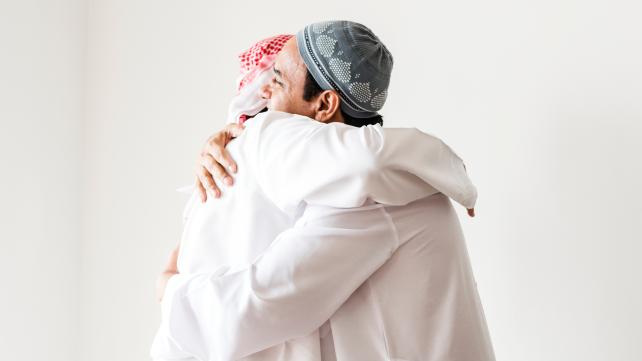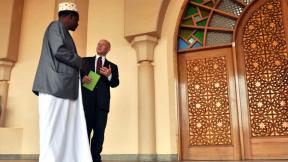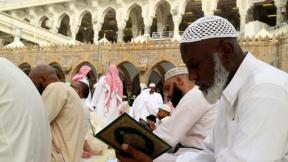
The first sin came from the words, “I am better than him. You created me from fire and created him from clay." (Quran 38:76).
Iblis had labeled himself as the greater one because he did not understand that distinctiveness and diversity is the order of creation.
The “I am better than you” attitude is a sickness. It is a mental health crisis that can escalate out of control. Those who decide to believe or designate that a difference between people is a defect have a perverted understanding.
People in a state of ignorance or arrogant disobedience to Allah may embrace the labeling of another human being, but then distort the meaning as a means to justify their prejudice and discrimination imposed upon others. Prejudice always segments the community. A segmented society will then typically perpetrate some sort of injustice upon another segment within the community. Social justice allows for equal access to favorable circumstances and social privilege. But prejudice is a social injustice. In the Muslim community, the arrogance of deciding that one Muslim is more knowledgeable, more pious, more deserving of respect than the other has led to the tragedy of Muslims going to war with each other.
Prejudice within the Muslim community has been a troubling and valid concern that has negatively influenced Muslim connectedness since the time of Prophet Muhammad, peace and blessings be upon him. But it need not have been.
During the time of the Prophet, the Banu Aws and Banu Khazraj had long had severe conflict between themselves, with each labeling the other as an enemy. Ibn Katheer, a scholar of Islamic fiqh and critical interpretation and explanation of Quran, explained that in the verses 103 to 105 in the Quran of Surah Ale-Imran, Allah teaches us how His power and majesty impact those who are willing to submit to Him.
Prophet Muhammad, peace and blessings be upon him, brought social reform to these tribes with the message of Islam and submission to Allah. The Banu Aws and Banu Kharaj, who had been mutually oppressive to each other, embraced Islam as a way of life, and were then able to make the spiritual journey to see past their differences, gain respect for each other and eventually develop fondness as strong as kinship.
“And hold firmly, all together, by the rope of Allah and be not divided; and remember the favor of Allah which He bestowed upon you when you were enemies and He united your hearts in love, so that by His grace you became as brothers; and you were on the brink of a pit of fire and He saved you from it. Thus does Allah explain to you His commandments that you may be guided.
And let there be among you a body of men who should invite to goodness, and enjoin equity and forbid evil. And it is they who shall prosper.”
(Quran 3:103-105)
Allah commands us to “hold firmly” – all together - “jami’an”. All together implies that all of the Muslims are one. The second part of the sentence commands us not to be divided.
We are not instructed to divide ourselves and only those who are from a certain city should hold all together, or only those who are a certain skin tone to all hold together, or only those who are of a particular understanding to all hold together. We ALL are instructed to hold firmly to Islam. We all are instructed to tightly grab that rope that saves and pulls us to righteousness.
We are instructed not to weaken ourselves with estrangement. We have no need to hyperfocus or negatively label the diversity of each other’s insight, hue, birthplace, speech, etc. The distinctiveness that we exhibit does not make one of us more human than another. Our unique qualities come solely at the pleasure and will of Allah.
The commandment in the Quran verified that there is no reason for the believers to perpetrate or experience any prejudice within our community.
Sadly though, in the United States, when Muslims reflect inward on the challenges faced, prejudice is number one on the list. That prejudice is manifested in racism, nationalism, and disagreement on fiqh. In some instances, the issue of Madhab (school of thought) has choked and divided communities of Muslims, even when they are the same ethnicity, racial group or nationality. Unfortunately, in many parts of the world with large Muslim majority populations, sectarian divisions run so severely as to drive the adherents on both sides to violence.
Our inclination to place a negative meaning to how we label and identify ourselves as Muslims most assuredly displeases Allah. Madhhabs were never intended to be identity labels. They are a system of methods to understand and apply scripture through a scholarly tradition of not just the founder, but the consensus and opinion of learned scholars over centuries. The Madhabs that exist have no disagreement on the foundations of Islam. All the Madhabs know and teach that Allah is One, Has no partner, Was never born and Will never die! All Madhabs teach that the Quran is a holy book and that Prophet Muhammad, peace and blessings be upon him, is the Messenger of Allah. All Madhabs agree that Muslims must strive towards righteousness, good deeds, obedience and submission to Allah.
Striving is a journey. It is a spiritual journey to obey Allah and develop regardfulness for each other. Prophet Muhammad, peace and blessings be upon him, warned that no human being is superior to another except in piety and good deed. He reminded us that this way of life is perfect and that every Muslim is a brother and sister to every Muslim, and that Muslims are one brotherhood and sisterhood. As Muslims, we all strive to carry the label of Muslim, Mu’min (believer) and Abd-Allah – servant of Allah. No other identity is as valuable or defines all of us better. Once a human carries this label, we love and respect them as our brother or sister in faith.
“And who is better in speech than one who invites to Allah and does righteousness and says, ‘Indeed, I am of the Muslims’”.
(Quran 41:33)








Add new comment